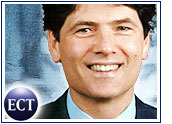
Forgive me, but amid all the excitement of the baseball post-season, it’s hard to believe there are other important things going on in the world.
Last week some important earnings numbers came out of the communications departments of archrivals SAP and Siebel, which I only got to after reading the expanded sports section of my hometown paper, Boston Globe. I also haven’t slept much lately.
Last week both SAP and Siebel said that their businesses were performing better. SAP’s revenues were up 17 percent year-over-year, and income was up 12 percent for the same period. Earnings looked particularly strong in the EMEA region where software revenues increased 24 percent.
Third quarter license revenue was up 10 percent over 2004’s second quarter for Siebel, while operating income was up 500 percent for the same period.
Inside Baseball
SAP continues to compare itself a “peer group” that it defines very precisely. According to the footnotes of the earnings announcement, the group consists of itself, “Microsoft (business solutions segment only), Oracle Corp. (business applications only), Peoplesoft and Siebel Systems, Inc.”
Sounds like comparing Gravensteins and Valencias to me, but I’m just an analyst.
According to SAP its share of revenues generated by these five companies was up from 53 percent at the end of 2003’s third quarter to 56 percent at the end of this year’s third quarter.
To be sure, earnings for many CRM vendors have been inching up this year. With all this positive earnings momentum, the question begging to be asked is whether or not CRM revenues in general will see a more bullish upswing and whether the economic underpinnings will enable more robust growth in the future.
As I mentioned above, I’m just an analyst, but on this topic I am also a skeptic. Much as I would like to see a return to double-digit growth in the CRM sector, something tells me we need a more reliable growth scenario for the rest of the economy before CRM is out of the woods.
Striking Out
My reasoning is not that complicated. CRM addresses the business issues vendors have in dealing with consumers — sales, marketing, service. But while consumers have been gamely pursuing their purchasing habits over the last few years, job growth has been nonexistent. In comparison, the economy added 23 million new jobs in the decade of the 1990s, a raw average of 2.3 million per year. Since we’ve added no net new jobs in the last few years, you could say that there is a “consumer gap” of roughly 7 to 10 million consumers. That translates into 7 to 10 million customers in need of service.
Some economists say that what has kept the consuming engine of the economy going has been mortgage refinancing, especially when people take equity out of their homes to finance current expenses. Those same economists tell us that our debt-to-equity ratio is rising and that this refinancing boom simply won’t go on forever. Sooner or later interest rates will rise to finance the national debt, or the last consumer will refinance and access to easy money will be over. And there is also the issue of inflation in things like fuel — and everything it touches — as well as healthcare. So the consumer dollar does not travel as far as it did a short while ago.
Long Relief
At some point consumers will need another way to get the money to buy the goods, and all of that leads to CRM. The slowdown we have experienced in the CRM sector over the last few years might not be caused exclusively by penny-pinching executives trying to ride out the economic turbulence. Part of it might simply be attributed to the fact that at present levels of consumption companies do not need to buy much more.
To be clear, the CRM industry is not going away; our best estimate is that CRM is a $13 billion market this year. But the problem is that CRM was about a $13 billion market last year, too.
We see many examples of new companies with innovative approaches to customer-centric processes and business problems entering the market. And the mainstream market, made up of smaller companies adopting CRM for the first time, continues to be strong according to Gartner’s 2003 market study. But these buyers are exerting downward pressure on prices, which is normal in this phase of a market.
To reinvigorate consumer spending that would create more demand for CRM products, we need a growing job market and a reduction in inflation for items that we cannot live without, such as gas for the car and pills for granny. We have tried stimulating job growth with tax cuts, but the numbers tell us the approach didn’t work. We need to try something different, and soon.
Denis Pombriant is former vice president and managing director of Aberdeen Group’s CRM practice and founder and managing principal of Beagle Research Group. In 2003, CRM Magazine named Pombriant one of the most influential executives in the CRM industry.





















































